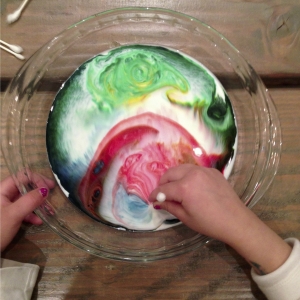Little Scientists
Scientists may use complex lab techniques to make discoveries, but their first observations are much the same as a child’s. The questions children ask naturally are based on the observations they have of the world around them. Allowing them to flesh out their curiosity with hands-on explorations and experiments will provide a fabulous foundation for learning and a love of the different sciences.
 Gathering and organizing information are core science skills, and information-hungry kids practice them naturally and enthusiastically. With a little organization from you, you could turn a child’s question into an afternoon of fun learning using the very grown up scientific method.
Gathering and organizing information are core science skills, and information-hungry kids practice them naturally and enthusiastically. With a little organization from you, you could turn a child’s question into an afternoon of fun learning using the very grown up scientific method.
- Look and ask: Pick up on an observation your child makes that inspires a question.
- Guess: Ask your child to guess why it’s so.
- Test: Create an experiment to put that guess to a test.
- Find Out: Can your child make a conclusion based on the test?
- Look and ask again: Finding answers leads to more questions and by generating new questions and tests, the whole process can start again.
Expose your children to early science by going on nature walks, collecting rocks and shells, cooking together, and reading about weather, dinosaurs, and space. By using everyday experiences that focus on science, you make it much easier for your preschooler to relate to the concepts. Play with bath water and toys to introduce the concepts of sinking and floating. Take a refrigerator magnet on a hunt to discover what else is magnetic. Or bake some cupcakes and measure, mix and add food coloring to white frosting to introduce color mixing concepts.
All children need to explore is the world around them and an adult’s science spin on their thinking. There’s chemistry in the kitchen, biology in the park, and physics in that pile of blocks. Go play, have fun… and learn!
By Aaron Goldschmidt, Founder & Director, Shine
